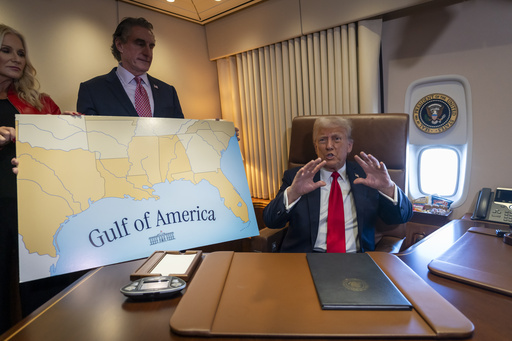
WASHINGTON — President Donald Trump is set to announce on Monday that the U.S. will impose a 25% tariff on all steel and aluminum imports, including those from Canada and Mexico, along with additional import duties later in the week.
During a flight from Florida to New Orleans for the Super Bowl, Trump informed reporters, “Any steel coming into the United States is going to have a 25% tariff.” When questioned about aluminum, he confirmed that “aluminum, too” will face similar trade penalties.
In response to this announcement, shares of American steel companies surged in futures trading prior to Monday’s market opening. Cleveland-Cliffs, interested in acquiring Pittsburgh’s U.S. Steel, saw its stock rise by 8%. U.S. Steel experienced a 5% increase, Nucor climbed nearly 8%, and Steel Dynamics gained over 6%.
Additionally, Trump reiterated his intention to announce “reciprocal tariffs” — expected on Tuesday or Wednesday — meaning the U.S. would impose duties on foreign products in retaliation for countries that have enacted tariffs on American goods.
“If they are charging us 130% and we’re charging them nothing, it’s not going to stay that way,” he asserted, underscoring his strong stance on trade.
This declaration is part of Trump’s broader approach to trade, demonstrating his readiness to utilize and implement import taxes. This move comes significantly sooner in his presidency than past instances, as previous years focused more on tax cuts and deregulation. A Republican, Trump views trade tariffs not only as leverage for negotiations on issues such as immigration but also as potential revenue sources to alleviate the federal budget deficit.
Following Trump’s initial announcement of reciprocal tariffs, financial markets experienced a decline on Friday. Stock prices were affected, partly due to a drop in consumer sentiment reported on the same day, where many respondents noted tariffs as a growing concern. The survey indicated rising expectations of inflation in upcoming months attributed to these duties.
No specifics were provided about the steel and aluminum tariffs or the reciprocal duties, and while Trump had previously threatened a 25% tariff on all goods from Canada and Mexico, he had temporarily paused this measure a week ago. He also implemented 10% duties on imports from China.
On Friday, Trump paused tariffs on millions of small packages primarily dispatched from fast-fashion companies, such as Temu and Shein, until customs officials could devise a method for implementing these taxes. These small packages were previously exempt from tariffs.
The latest remarks from Trump have sparked immediate concern among various global trade partners. South Korea’s acting president, Choi Sang-mok, convened a meeting on Monday with top trade and foreign policy officials to assess the potential effects of the proposed tariffs on the nation’s industries.
Choi’s office, which also oversees finance, confirmed discussions on the anticipated impact and possible responses from Seoul, although no specific outcomes of the meeting were revealed. As trading commenced on Monday, major South Korean steel manufacturers, including POSCO and Hyundai Steel, saw a decline in their stock prices. South Korea exported approximately $4.8 billion worth of steel to the U.S. from January to November last year, representing 14% of its overall steel exports during that timeframe.

